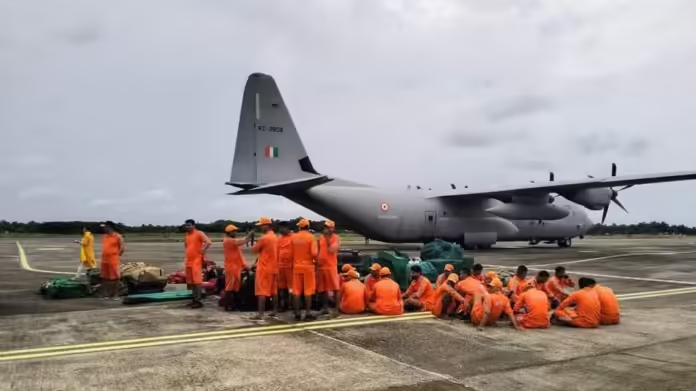The central government has sanctioned an advance release of Rs 40 crore to support the flood-affected state of Tripura. Union Home Minister Amit Shah made the announcement as the state continues to battle severe flooding since August 19. The floods have displaced over 60,000 people and claimed 20 lives. The funds are aimed at aiding ongoing relief operations and providing immediate assistance to those impacted by the disaster.
The flooding in Tripura has been described as one of the worst in recent years. Heavy rains have caused rivers to overflow, submerging vast areas and cutting off many communities from essential services. The state administration, along with the National Disaster Response Force (NDRF) and the Indian Army, has been working around the clock to evacuate residents from the most affected areas. Temporary shelters have been set up to accommodate the displaced, while food, water, and medical supplies are being distributed to those in need.
Chief Minister Manik Saha, who has been personally overseeing the relief efforts, expressed gratitude for the central government’s swift financial support. He highlighted the urgent need for resources to repair damaged infrastructure, restore power, and ensure the safety of the state’s residents. The Chief Minister also conducted an aerial survey of the flood-hit regions to assess the extent of the damage and to coordinate further relief measures.
The release of funds by the central government comes as a significant relief to the state, which has been struggling to manage the scale of the disaster. With roads washed away and bridges destroyed, accessing some of the worst-hit areas has been a challenge for rescue teams. However, efforts are being intensified to reach every corner of the state and provide relief to those stranded.
Local authorities have issued warnings for more rain in the coming days, raising concerns about the possibility of further flooding. The state government has urged residents in vulnerable areas to remain vigilant and follow evacuation orders promptly. The administration has also appealed to neighboring states for additional support, particularly in the form of rescue boats and medical supplies.
The impact of the floods on agriculture has been devastating, with thousands of hectares of crops destroyed. Farmers in the region are facing massive losses, which could have long-term effects on the state’s economy. The government has promised to compensate those affected and is planning to introduce measures to help the farming community recover.
In addition to the central government’s contribution, various non-governmental organizations (NGOs) and volunteers have stepped up to assist in relief operations. They are working alongside government agencies to ensure that aid reaches even the most remote areas. The spirit of solidarity among the people of Tripura has been evident as communities come together to support each other during this crisis.
The Tripura floods have once again highlighted the need for improved disaster preparedness in the region. Experts have called for better infrastructure, early warning systems, and more robust disaster management plans to mitigate the impact of such natural calamities in the future. The government has acknowledged these concerns and is expected to review its disaster management strategies in light of the recent events.
As relief operations continue, the focus remains on saving lives and providing immediate support to those affected. The central government’s financial aid will play a crucial role in these efforts, but the road to recovery for Tripura will be long and challenging. The state will need sustained support and resources to rebuild and restore normalcy in the coming months.
The residents of Tripura are showing resilience in the face of adversity. With the combined efforts of the government, NGOs, and the local population, there is hope that the state will overcome this disaster and emerge stronger.


